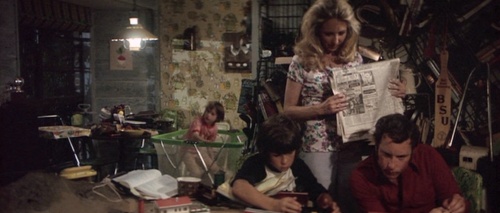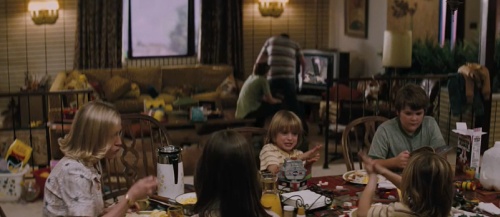Super 8 (J.J. Abrams, 2011)

With Super 8, J.J. Abrams pays tribute to a body of work that some feel Hollywood has been methodically aping for thirty years: Steven Spielberg’s work of the late 1970s and early 1980s. Yet even if you accept the Peter Biskind “Hollywood drank Spielberg’s Kool Aid and was forever changed” school of thought – about which I said a bit more here – you’d have to acknowledge that it was a particular aspect of Spielberg’s filmmaking that Hollywood latched on to. The lesson everybody seemed to learn from Jaws, Close Encounters, and E.T. (plus George Lucas’ Star Wars) was that people were after escapist, wonder-inducing science fiction and fantasy. What almost all of the imitators didn’t understand, or couldn’t replicate, was Spielberg’s knack for depicting the real world setting and the domestic backdrop against which the adventure took place. That, of course, was what made the transition to the extraordinary and other-worldly in Spielberg’s work so effective. What makes Super 8 really interesting, albeit not completely successful, is the care Abrams devotes to replicating that more mundane side of the Spielberg formula.
The affinity is perhaps to be expected, with Spielberg closely involved in his role as producer, and a genesis for the project that closely recalls the background to E.T.. Like that film, Super 8 is the result of a fusion of two different ideas: one an intimate story about late childhood / early adolescence, and the other a science fiction story about alien visitation. Abrams’ formulation adds an element of meta-commentary: the kids are budding filmmakers, who in the small-town America of 1979 are making their own amateur zombie movie on Super 8 film. While doing so they witness a train derailment, and it quickly becomes apparent that something scary and dangerous escaped from the wreckage.
What works really well is Abrams’ depiction of the kids’ world. Abrams does a good job of replicating Spielberg’s affinity for middle-American communities, creating a compelling and interesting environment. The film’s setting of small-town Ohio feels both real and worth visiting, and the domestic environments – chaotic, cluttered, and lived-in – have a verisimilitude that is straight out of early Spielberg (compare the shots from Close Encounters and Super 8 below). Abrams’ young protagonists are likable and engaging, and I particularly liked that Abrams included the obligatory fat kid – a staple of lesser Spielberg knock-offs like The Goonies – but made him confident, bossy, and creative rather than a simply the butt of jokes. I have said before that what works about E.T. is that it feels like it would be as interesting a film without the alien, and that could be said of Super 8, too: you can imagine this basic set-up seguing into a really effective Stand By Me-esque coming-of-age film.


What I think ultimately makes it a lesser film than E.T., though, is that you actually feel it might have been better without the alien. Abrams tries hard to make the science-fiction side of the story work, and the film is full of very direct homages to the more thrilling aspects aspects of Spielberg’s work: Close Encounters, in particular, is very heavily leant on in the sections dealing with the military’s attempted cover-up and eventual evacuation of the town. Michael Giacchino’s score similarly works hard and includes plenty of musical nods to John Williams’ work for Spielberg. Yet the story never quite hangs together, and the thriller aspects seem to evolve in parallel to the kids’ plotline: despite witnessing the train accident, for a surprising portion of the film the kids remain oblivious to many of the important plot developments. When the two narrative threads do converge, the conclusion seems rushed and muddled, with the Spielberg-esque wondrous resolution not quite making sense. The audience is left to piece together exactly how the main story was resolved from various inferences, and the resolution seems to occur largely independently of the actions of the heroes.
It’s disappointing that the final third falls short, because Abrams does so much right in the rest of the movie. He is a talented and populist – in the best sense of the word – filmmaker, and despite its flaws Super 8 reinforces the feeling that he could bring back some of the joy and attention to character that has been leached out of mainstream blockbusters.